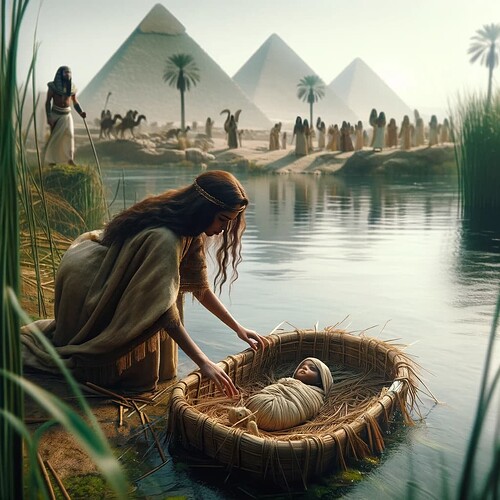![]() January 30: Exodus 1-2: The Birth of Moses and the Providence of God
January 30: Exodus 1-2: The Birth of Moses and the Providence of God
From Peril to Providence: The Early Life of Moses
![]() Introduction
Introduction
On January 30th, our reading takes us to the first two chapters of Exodus, marking a pivotal transition in the history of Israel. These chapters introduce us to the birth of Moses against the backdrop of Israel’s oppression in Egypt, setting the stage for God’s redemptive plan.
![]() Exodus 1: The Oppression of Israel in Egypt
Exodus 1: The Oppression of Israel in Egypt
Exodus 1 describes the severe oppression of the Israelites in Egypt, a time when their population growth led to increased fear and harsh treatment by the Egyptians.
![]() Key Verse: “But the more they were oppressed, the more they multiplied and spread; so the Egyptians came to dread the Israelites.” — Exodus 1:12
Key Verse: “But the more they were oppressed, the more they multiplied and spread; so the Egyptians came to dread the Israelites.” — Exodus 1:12
![]() Exodus 2: The Birth and Early Life of Moses
Exodus 2: The Birth and Early Life of Moses
Exodus 2 narrates the birth of Moses during a time of great peril, his miraculous preservation in the Nile, and his early years. It sets the stage for his future role as Israel’s deliverer.
![]() Key Verse: “When she [Moses’ mother] could hide him no longer, she got a papyrus basket for him and coated it with tar and pitch. Then she placed the child in it and put it among the reeds along the bank of the Nile.” — Exodus 2:3
Key Verse: “When she [Moses’ mother] could hide him no longer, she got a papyrus basket for him and coated it with tar and pitch. Then she placed the child in it and put it among the reeds along the bank of the Nile.” — Exodus 2:3
![]() Key Themes and Reflections:
Key Themes and Reflections:
The Providence of God: These chapters illustrate God’s providential care, especially in the preservation and preparation of Moses for his future task.
Resistance Against Oppression: The story of the Israelite midwives who feared God and resisted Pharaoh’s edict underscores the theme of resisting unjust authority.
God’s Timing in Deliverance: The narrative demonstrates that God’s plans are often long-term, unfolding in ways that are not immediately apparent.
![]() Today’s Application:
Today’s Application:
Reflect on how God’s providence has been at work in your life, often in ways you might not have immediately recognized. How can you trust in God’s timing and plan, especially in challenging situations?
![]() Hidden Gem:
Hidden Gem:
Did you know? The story of Moses’ preservation in the Nile reflects the theme of “water” as a symbol of both danger and deliverance, a motif that recurs throughout the Bible.
![]() Reflective Q&A:
Reflective Q&A:
![]() Exodus 1: Oppression and Growth
Exodus 1: Oppression and Growth
![]() Resilience in Adversity: How does the experience of the Israelites in Egypt teach us about
Resilience in Adversity: How does the experience of the Israelites in Egypt teach us about
resilience and faith in times of hardship?
A: The Israelites’ experience in Egypt demonstrates that adversity and oppression, while difficult, can strengthen and fortify a community’s faith and identity. Their remarkable growth amidst hardship reminds us of the resilience that comes from steadfast faith and trust in God’s promises.
![]() Exodus 2: The Early Life of Moses
Exodus 2: The Early Life of Moses
![]() Divine Providence in Challenging Times: How does the story of Moses’ early life reveal God’s providence in times of danger?
Divine Providence in Challenging Times: How does the story of Moses’ early life reveal God’s providence in times of danger?
A: Moses’ early life is a testament to God’s providence, where seemingly desperate situations are turned into opportunities for divine intervention. The story of his preservation and upbringing under Pharaoh’s own roof illustrates how God works through challenging circumstances to prepare and protect His chosen instruments for future purposes.
![]() Join the Discussion:
Join the Discussion:
How do the first two chapters of Exodus shape your understanding of God’s providence and timing? Share your insights and reflections in the comments below!
exodus #Moses #ProvidenceOfGod #FaithInHardship #BibleStudy #SpiritualJourney #ExodusReading
![]() See You Tomorrow in Exodus: Continue your journey through Exodus and explore the unfolding of God’s deliverance for His people.
See You Tomorrow in Exodus: Continue your journey through Exodus and explore the unfolding of God’s deliverance for His people.
